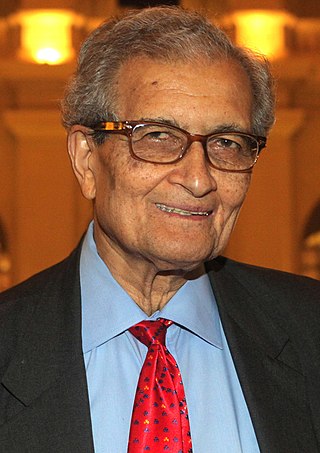
Amartya Kumar Sen is an Indian economist and philosopher. Sen has taught and worked in the United Kingdom and the United States since 1972. In 1998, Sen received the Nobel Memorial Prize in Economic Sciences for his contributions to welfare economics. He has also made major scholarly contributions to social choice theory, economic and social justice, economic theories of famines, decision theory, development economics, public health, and the measures of well-being of countries.

Antonio Negri was an Italian political philosopher known as one of the most prominent theorists of autonomism, as well as for his co-authorship of Empire with Michael Hardt. Born in Padua, Italy, Negri became a professor of political philosophy at the University of Padua, where he taught state and constitutional theory. Negri founded the Potere Operaio group in 1969 and was a leading member of Autonomia Operaia, and published hugely influential books urging "revolutionary consciousness."

Michael Albert is an American economist, speaker, writer, and political critic. Since the late 1970s, he has published books, articles, and other contributions on a wide array of subjects. He has also set up his own media outfits, magazines, and podcasts. He is known for helping to develop the socioeconomic theory of participatory economics.

Sir James Cochran Stevenson Runciman, known as Steven Runciman, was an English historian best known for his three-volume A History of the Crusades (1951–54). His works had a profound impact on the popular conception of the Crusades.

Cass Robert Sunstein is an American legal scholar known for his work in constitutional law, administrative law, environmental law, and behavioral economics. He is also The New York Times best-selling author of The World According to Star Wars (2016) and Nudge (2008). He was the administrator of the White House Office of Information and Regulatory Affairs in the Obama administration from 2009 to 2012.
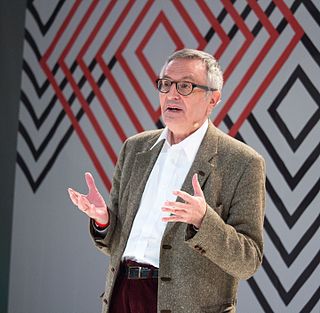
John Nicholas Gray is an English political philosopher and author with interests in analytic philosophy, the history of ideas, and philosophical pessimism. He retired in 2008 as School Professor of European Thought at the London School of Economics and Political Science. Gray contributes regularly to The Guardian, The Times Literary Supplement and the New Statesman, where he is the lead book reviewer. He is an atheist.
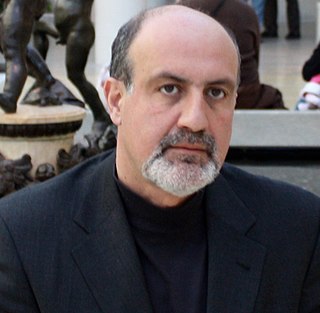
Nassim Nicholas Taleb is a Lebanese-American essayist, mathematical statistician, former option trader, risk analyst, and aphorist. His work concerns problems of randomness, probability, and uncertainty.
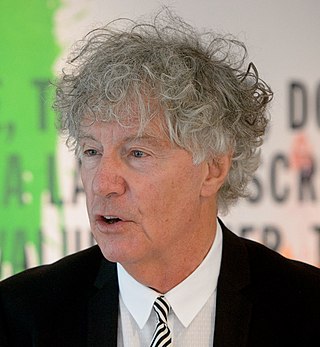
Born in southern Australia, John Keane is Professor of Politics at the University of Sydney. For 25 years he also held a position at the Wissenschaftszentrum Berlin (WZB), which he resigned from in November 2023.

John Naughton is an Irish academic, journalist and author. He is a senior research fellow in the Centre for Research in the Arts, Social Sciences, and Humanities at Cambridge University, Director of the Press Fellowship Programme at Wolfson College, Cambridge, Emeritus Professor of the Public Understanding of Technology at the British Open University, adjunct professor at University College, Cork and the Technology columnist of the London Observer newspaper.

Timothy David Snyder is an American historian specializing in the history of Central and Eastern Europe, the Soviet Union, and the Holocaust. He is the Richard C. Levin Professor of History at Yale University and a permanent fellow at the Institute for Human Sciences in Vienna.
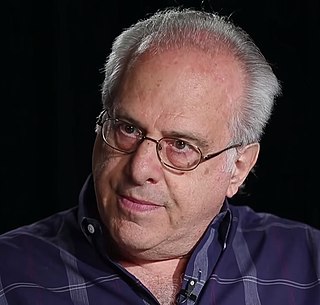
Richard David Wolff is an American Marxian economist known for his work on economic methodology and class analysis. He is a professor emeritus of economics at the University of Massachusetts Amherst and a visiting professor in the graduate program in international affairs of the New School. Wolff has also taught economics at Yale University, City University of New York, University of Utah, University of Paris I (Sorbonne), and The Brecht Forum in New York City.
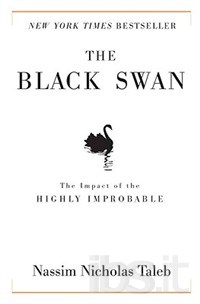
The Black Swan: The Impact of the Highly Improbable is a 2007 book by Nassim Nicholas Taleb, who is a former options trader. The book focuses on the extreme impact of rare and unpredictable outlier events—and the human tendency to find simplistic explanations for these events, retrospectively. Taleb calls this the Black Swan theory.
James Franklin is an Australian philosopher, mathematician and historian of ideas.
Hypocrisy is the practice of feigning to be what one is not or to believe what one does not. The word "hypocrisy" entered the English language c. 1200 with the meaning "the sin of pretending to virtue or goodness". Today, "hypocrisy" often refers to advocating behaviors that one does not practice. However, the term can also refer to other forms of pretense, such as engaging in pious or moral behaviors out of a desire for praise rather than out of genuinely pious or moral motivations.

Ian Matthew Morris is a British historian, archaeologist, and Willard Professor of Classics at Stanford University.

James Miller is an American writer and academic. He is known for writing about Michel Foucault, philosophy as a way of life, social movements, popular culture, intellectual history, eighteenth century to the present; radical social theory and history of political philosophy. He currently teaches at The New School.

The Better Angels of Our Nature: Why Violence Has Declined is a 2011 book by Steven Pinker, in which the author argues that violence in the world has declined both in the long run and in the short run and suggests explanations as to why this has occurred. The book uses data simply documenting declining violence across time and geography. This paints a picture of massive declines in the violence of all forms, from war, to improved treatment of children. He highlights the role of nation-state monopolies on force, of commerce, of increased literacy and communication, as well as a rise in a rational problem-solving orientation as possible causes of this decline in violence. He notes that paradoxically, our impression of violence has not tracked this decline, perhaps because of increased communication, and that further decline is not inevitable, but is contingent on forces harnessing our better motivations such as empathy and increases in reason.
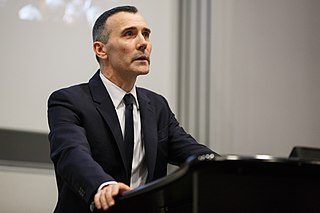
Richard Bourke is a UK-based Irish academic specialising in the history of political ideas. His work spans ancient and modern thought, and is associated with the application of the historical method to political theory. He is Professor of the History of Political Thought at the University of Cambridge, and a Fellow of King's College, Cambridge. He was formerly Professor of the History of Political Thought and Co-Director of the Centre for the Study of the History of Political Thought at Queen Mary, University of London. In July 2018 Bourke was elected a Fellow of the British Academy (FBA).
Helen Thompson is an English academic who teaches politics at Cambridge University, where she is a professor of political economy and a fellow of Clare College, Cambridge, where she is also Director of Studies.
Political hypocrisy refers to any discrepancy between what a political party claims and the practices the party is trying to hide. Modern political debate is often characterized by accusations and counter-accusations of hypocrisy.
















